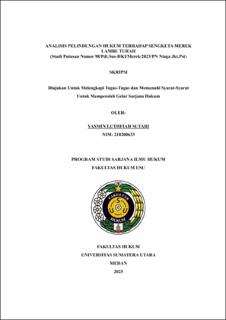| dc.description.abstract | Trademarks, as a form of intellectual property, play a crucial role in establishing identity and serve as strategic marketing tools for products or services. However, in practice, Indonesia’s trademark registration system, which adheres to the first to file principle, is often abused by applicants acting in bad faith who register trademarks belonging to other parties for personal gain. This creates injustice and can harm trademark owners who have been using the mark in good faith, as seen in the Lambe Turah trademark dispute through Decision Number 98/Pdt.Sus-HKI/Merek/2023/PN Niaga Jkt.Pst. The purpose of this study is to examine the legal protection available to trademark owners who act in good faith but are not registered under Law No. 20 of 2016 on Trademarks and Geographical Indications, to understand the legal criteria used to assess substantial or overall similarity and bad faith in trademark dispute, and to analyze the legal considerations of the panel of judges in deciding the Lambe Turah trademark dispute in Decision Number 98/Pdt.Sus-HKI/Merek/2023/PN Niaga Jkt.Pst.
This research uses a normative juridical method with a statute approach and a case approach. Data were obtained through literature studies that included primary, secondary, and tertiary legal materials, then analyzed qualitatively using deductive reasoning.
The results of the study show that legal protection for trademark owners who act in good faith but are not registered is possible to a limited extent in the Indonesian trademark legal system through the mechanism of filing a lawsuit to cancel a registered trademark based on bad faith, as regulated in Article 76 jo. Article 21, paragraph (3) of Law No. 20 of 2016 on Trademarks and Geographical Indications. The legal criteria in trademark disputes include the assessment of trademark similarity and the presence of bad faith as regulated in Article 21 of Law No. 20 of 2016 on Trademarks and Geographical Indications. In Decision Number 98/Pdt.Sus-HKI/Merek/2023/PN Niaga Jkt.Pst, the Panel of Judges declared the defendant's trademark invalid because it was proven to be entirely similar visually, phonetically, and conceptually to the plaintiff's trademark and was proven to be in bad faith because it was registered without the plaintiff's knowledge or consent. This decision demonstrates that the first to file principle is not an absolute principle if it conflicts with the principle of justice, and serves as an example of legal protection for trademark owners who act in good faith but are not registered. | en_US |


